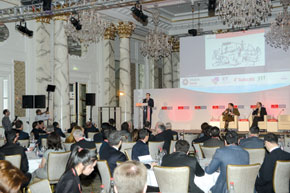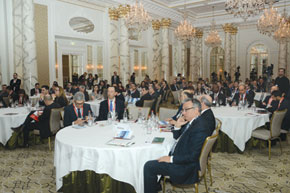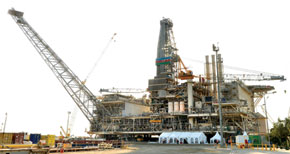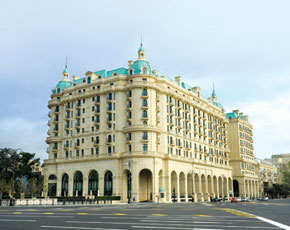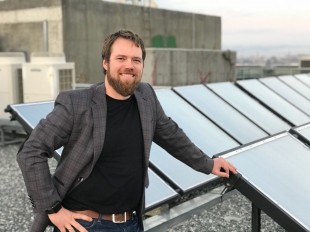A bright if chilly March morning paints sunshine upon the creamy stone of the Haussmannesque Four Seasons Hotel, a neo-Parisian styled palace on the Boulevard fringe of Baku’s Old City. Mood lit by chandeliers in the ballroom sit a who’s-who of business and diplomacy nibbling strawberry- topped mini croissants. The occasion is the Azerbaijan Investment Summit, a forum promising to look to 2020 and beyond with the focus of accelerating Azerbaijan’s economic development.
While minor sessions touch on Oil and Gas and on Downstream Processing, the summit’s main themes concern efforts to diversify the economy with a particular stress on human capital and education. It’s an event under the organisational umbrella of The Economist magazine – a publication which genial Deputy Minister of Foreign Affairs Hafiz Pashayev laughingly rues he used to buy when it was only $1.50 a copy... Pashayev, one of many outstanding speakers, is here wearing his educational hat as rector of ADA University. Indeed the official proceedings started the evening before, away from the main venue at ADA’s sparkling new parkland premises in Baku’s Ganjlik District.
No room for complacency
The main day kicks off with Professor Grzegorz Kolodko, economist and former deputy prime minister of Poland, whose time as finance minister in the 1990s is remembered as pivotal in leading his nation to OECD membership. Peering learnedly over his spectacles, Kolodko paints a somewhat sombre picture of the global economic environment with political instability casting ominously long shadows. For Azerbaijan, he muses, while the outlook appears good by classical measures, there will be no space for complacency as here “anything less than 6% [growth] counts as failure”.
Doubling GDP
More upbeat is Rufat Mammadov of AzPromo (Azerbaijan Export & Investment Promotion Foundation), an organisation whose raison d’etre is to attract investments to the nation’s non oil-and-gas sectors as well as to promote Azerbaijani products abroad. Mammadov stresses that a favourable business climate forms the cornerstone of economic policy. He reels off a series of positive developments designed to make Azerbaijan suitably attractive to investors, notably e-taxation measures, ease of business registration and the equality of foreign and local investors within a system described as “quite reformist”. This, he reiterates, is part of Azerbaijan’s Vision 2020 development concept that aims to double GDP by the end of the decade. The target, he declares, is a figure of $13,000 per capita with non-oil GDP to grow at least 7% per annum. Of current projects under way, Mammadov highlights Balakhani’s Eco-Industrial Park, a venture for waste recycling and waste-to-energy re-use, along with Sumqayit’s Chemical-Industrial Park, where seven-year tax holidays add to the convenience of a plug-and-play business concept.
Eloquent presentations follow including those by Farid Akhundov, CEO of Pasha Bank, and Shahmar Movsumov, executive director of the State Oil Fund (SOFAZ), whose gigantic US$35 billion of investments are equivalent to around half of national GDP. Movsumov explains that SOFAZ is not permitted to invest within Azerbaijan as that could cause the very market distortions that a sovereign wealth fund is designed to prevent.
Breathing space
Nonetheless, while complimenting Azerbaijan’s extensive infrastructural improvements in recent years, he repeats a point that he made forcefully in London’s Caspian Crossroads conference a few days earlier – that governments make bad businessmen. The idea of creating “breathing space” for small and medium sized businesses would prove to be a commonly repeated theme throughout the day’s conference. The panel on "Creating a prosperous, mixed economy – lessons in economic diversification" winds up with Nargiz Nasrullayeva-Muduroglu, executive director of Baku’s American Chamber of Commerce. An electric buzz of approval and spontaneous applause burst out when she highlights several notable problems that, she feels, still need addressing in improving Azerbaijan’s economic situation – namely the need for bonded warehousing, more comprehensive e-government, market access issues and visa problems... Visas, she argues, need to be more conveniently available such that business people could make a spontaneous decision to drop into Baku when on a visit to the region, something currently precluded by the multi-day visa application process.
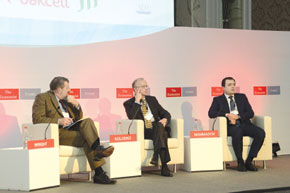 Simon Wright, industry editor, The Economist; Prof. Grzegorz Kolodko, former finance and prime minister, Poland; Rufat Mammadov, president, Azpromo
Simon Wright, industry editor, The Economist; Prof. Grzegorz Kolodko, former finance and prime minister, Poland; Rufat Mammadov, president, Azpromo Irreversible change
Amongst the most eagerly awaited panels, that on education, is spearheaded by Azerbaijan’s youthful new minister of education, Mikayil Jabbarov. Originally trained as a lawyer, Jabbarov spent nine years at the Ministry of Economic Development and has brought a lot of fresh thinking to the Ministry of Education in his first 11 months. Stressing the key status of education as the basis for a knowledge-based modern economy, Jabbarov is nonetheless keen to manage expectations. “Moving too fast is as bad as moving too slowly,” he cautions and what is crucial is to make solid, systemic paradigm changes that will be irreversible and not reliant on any particular minister. Addressing the question of whether the current education system is fit for purpose, he urges the audience to take a mental step back and remember that the task at hand is to transform, through evolution rather than revolution, a system designed for an entirely different state – the USSR. A notable success to date has been the refurbishment of 60% of high schools in the past ten years, following a previous decade of disintegration.
Minister Jabbarov also highlights initiatives in which SOFAZ is sponsoring incoming educators and schemes to allow many undergraduates to study in universities abroad, albeit noting that this was a short/medium term tactical step and that sustainability beyond SOFAZ funding must be the longer-term aim. The higher education baton then passes to Hafiz Pashayev, rector of the ADA University, and Ilqar Veliyev of EY (Ernst & Young) who notes that it can be tough to retain highly educated talent in country.
Tourism
Creating a break from the panel-style format, Minister of Culture & Tourism Abulfas Qarayev delivers a stirring, essentially promotional presentation stressing the importance of inter-cultural tolerance in Azerbaijan, noting that major holidays from all faiths are celebrated here (Hanukkah and Christmas as well as Muslim festivals) and suggesting that this attitude of tolerance makes for a population that is open-minded and adaptable to the ever-changing world. The minister underlines that the third, biannual World Forum on Intercultural Dialogue (due in Baku, 2015) will be remarkable in bringing together support from five of the world’s major institutions including UNESCO, the World Tourism Organisation and the Council of Europe.
Turning to tourism, Qarayev notes that Azerbaijan continues to promote itself on CNN and EuroNews as well as at travel- and book-fairs with 19 Azerbaijani travel companies represented at the recent Berlin Tourism Fair. Baku has its own annual tourism fair too, along with its own Institute of Tourism and an EU twinning project with Austrian assistance helping to inspire creativity in the management of the industry. Despite a dip last year, Minister Qarayev is keen to cite optimistic figures suggesting that incoming tourism is up around 40% and that hotel occupancy has tripled in recent years.
C-Word
The summit reaches a crescendo with two contrasting sessions on infrastructure and new industries – telecommunications, finance and Internet start-ups.
In his mellow, soft-Geordie lilt, Bakcell CEO Richard Shearer insists that broadband rather than mobile phone penetration currently correlates more directly with a developed economy. Mobile Internet, while widely available and comparatively easy to install, is limited by both physics (limited spectrum width) and economics (a smart phone costing almost the same as a pc).
The World Bank’s Caucasus director, Henry Kerali, causes the afternoon’s greatest frisson when he mentions the ‘c’ word. Calling corruption, the “elephant in the room” he sketches out an imaginary road-building project scenario in which cost-price differentials could be as much as 150%. What is needed, Kerali insists, is a public investment management system to keep an eye on corruption. Anti-corruption is improving but slower than hoped, and the well-directed presidential decrees against graft need to be properly implemented, he stresses.
“What is the most important infrastructure project to implement?” comes one question. “That’s like asking me who is my favourite child,” retorts Kerali to general mirth. The key, he explains, is to focus on bottlenecks that block economic priorities and beware of leading with politics. One key thing to bear in mind is that you can do all you like to improve your road systems, but if you don’t sort out border crossing efficiency the delays added can dwarf those of the actual transport.
Energy efficiency
Mehmet Ali Keciciler from Schneider Electric broadens the infrastructure debate to include power generation, noting that while Baku enjoys over 90% levels of electricity, gas and water supply, in some rural regions supply levels are as low as 50%. Solutions for power need not only be limited to new facilities, he insists, but as much as 30% of capacity could be freed up with developing efficiency mindsets in consumers along with smart energy management systems. Sadly, he fears that the operational phase of Azerbaijan’s energy efficiency legislation appears to have stalled.
Opportunity
The final two speakers bring the summit to a relatively uplifting conclusion. Clemente Cappello, whose Sturgeon Capital is a boutique investment management company, explains a curious paradox: press negativity leads to an unfavourable public perception of Eurasia, but this is, in fact, to the advantage of investors – the real situation is far less negative than the perception and the lack of awareness often leads to an undervaluing of assets and bonds, creating a useful value difference for those in the know. Addressing the question of corruption, Cappello accepts that “bureaucracy creates costs and opportunities for naughty people” but adds that the situation in his native Italy is probably not so very different.
More positive still is Farid Ismayilzada, founder and CEO of Goldenpay, an Internet payments system and growing single-portal platform for a wide spectrum of online sales channels. Ismayilzada returned from Silicon Valley to start his Azerbaijani business from scratch and is keen to point out that he found the tax system transparent and has suffered no corruption problems whatever. This, he suggests, shows that transparency and full disclosure pay off, and that Azerbaijan is indeed a place of opportunity for those with the skills, ambition and vision to make things happen.
On this positive note, Economist journalist and conference chairman Simon Wright brings proceedings to a close, ushering all assembled to retire for a well-earned glass of wine.
